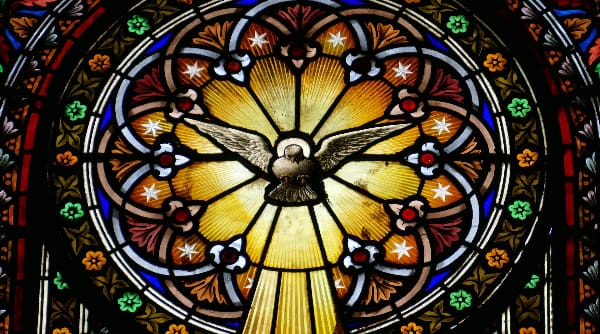“I answer that, the name Love in God can be taken essentially and personally. If taken personally it is the proper name of the Holy Ghost: as Word is the proper name of the Son.”
— St. Thomas Aquinas, Summa Theologica, I, Q. 37, art. 1
“I answer that, Gift, taken personally in God, is the proper name of the Holy Ghost.”
— St. Thomas Aquinas, Summa Theologica, I, Q. 38, art. 2
The Catechism of the Catholic Church (no. 684) explains that although the Holy Spirit was the last person of the Holy Trinity to be revealed to us, “through his grace, the Holy Spirit is the first to awaken faith in us and to communicate to us the new life,” which is to “know the Father and the one whom he has sent, Jesus Christ” (see John 17:3). We come to know the Father and the Son through the stirrings of the Holy Spirit in our soul.
The term spirit translates the Hebrew word ruah, which means “breath,” “air,” or “wind.” It comes to us from the Latin word spiritus, and in English has typically been translated “spirit,” although some translators, especially in days gone by, have also used the synonym “ghost” to mean exactly the same thing. All readers have certainly heard of the Holy Ghost, and this name happens to be used in the translation of St. Thomas’s Summa Theologica by the Fathers of the English Dominican Province that I routinely use, which is why it appears in this chapter’s opening quotations.
Although Christ has instructed us to call this Third Person by the name “Holy Spirit,” the Holy Spirit is also known by many other titles. Christ called Him the “Paraclete” or “Counselor” as well as “the Spirit of truth” (John 14:16). The Catechism (693) relates that in other books of the New Testament He is called the “Spirit of the promise,” the “Spirit of adoption,” the “Spirit of Christ,” the “Spirit of the Lord,” the “Spirit of God,” and the “Spirit of glory.”
In his masterful modern summary of the writings of Pope Saint John Paul II on the Holy Spirit, Fr. Bill McCarthy, MSA, has provided a full list of the fifty-two scriptural titles and images of the Holy Spirit, including Spirit of Love (Gal. 5:22) and Gift (John 3:34; Act 2:38; 10:45).
St. Thomas Aquinas, like great teachers who came before him and since, has zoomed in on two names of the Holy Spirit especially suited for our examination of His seven loving gifts: Love and Gift.
Love with a capital L
St. Thomas tells us, following Pope St. Gregory the Great: “The Holy Ghost Himself is Love.” He elaborates further that the Holy Spirit is said to be the bond of Love between the Father and the Son and that “from the fact that the Father and the Son mutually love one another, it necessarily follows that this mutual Love, the Holy Ghost, proceeds from both. As regards origin, therefore, the Holy Ghost is not the medium, but the third person in the Trinity.”
To make matters more amazing, more loving, and more beautiful, St. Thomas also expounds upon St. Augustine’s profound declaration that the Father and the Son love each other by the Holy Spirit. St. Thomas explains that the phrase “to love” can be taken two ways. In one sense, it means that the Father and the Son love each other by Their own essence. In another, it means that the Father and the Son “spirate,” or breathe, the love that is the Holy Spirit. Further, “the Father loves not only the Son, but also Himself and us, by the Holy Ghost.”
Perhaps these thoughts are over our heads, but it is well worth it to try to wrap our heads around them (or, as we’ll soon see when we examine the gifts of the Holy Spirit, to allow Love Himself to help us understand).
Love is expressed in a fundamental way in the act of giving. After addressing Love as a name of the Holy Spirit, Thomas next considers His holy name of Gift, starting with a quotation from St. Augustine: “ ‘As the body of flesh is nothing but flesh; so the gift of the Holy Ghost is nothing but the Holy Ghost.’ But the Holy Ghost is a personal name; so also therefore is Gift.”
Thomas explicates that the word gift denotes a capacity for being given, “and what is given has an aptitude or relation both to the giver and to that to which is given. For it would not be given by anyone unless it was his to give; and it is given to someone to be his.” (After all, as some Scholastic theologians are wont to say, “You can’t give what you don’t have!”) Thomas explains further that only a divine Person may give divine things, and of all creatures on earth, only human beings have been given by God the capacity to receive, enjoy, and use the divine gifts of the Holy Spirit. Only we have the capacity freely to know and love God rightly. Still, although we possess these receptive rational powers, we can receive these divine gifts and possess God only when He gives them and thereby gives Himself to us as a gift. In other words, the Holy Spirit, “Love proceeding,” freely gives us the gift of Himself!
St. Thomas elaborates that the Holy Spirit gives us Himself as a free, gratuitous, nonreturnable gift of love, as we do when we give loving gifts to others with no expectation of personal gain, because we wish them well. Love itself, then, is the “first gift through which all free gifts are given. So since the Holy Ghost proceeds as love . . . He proceeds as the first gift.” Further, as St. Augustine says in his book on the Trinity, “By the gift, which is the Holy Ghost, many particular gifts are portioned out to the members of Christ.”
+
This article is adapted from a chapter in Seven Gifts of the Holy Spirit by Dr. Kevin Vost, which is available from Sophia Institute Press.
Art for this post: Cover and featured image used with permission.





